The Novel Corona Virus Covid -19 Info Instructions for the new daily routines Updated: March 15 2020
- Details
- Written by Ministry of Health

Instructions for the new daily routines Updated: March 15 2020
Gatherings and events All gatherings of more than 10 people are not permitted.
Commercial establishments and entertainment venues will be closed as of March 15 2020
Shopping malls (except supermarkets and pharmacies, places that sell food to take away)
Discos, bars, pubs and dining establishments, including hotel dining (except dining establishments that sell take-away food)
Banquet halls
Gyms and swimming pools, water parks, zoo, safaris, petting zoos
Ritual baths (men), and bathhouses
Cinemas, theaters and other cultural institutions
Amusement facilities and amusement parks
Businesses for non-medical treatment of the human body
Exhibition halls and fairgrounds
Public boats
Cable cars
Heritage sites
Prayer and religious ceremonies will be conducted in groups of up to 10 people each, keeping a distance of 2 meters from person to person and no more than 2 groups at a time.
Prohibition of visits to welfare, nursing or healthcare facilities serving as homes for their residents, with the exception of a maximum of one caregiver, preferably a permanent caregiver.
Hospitals and institutions
Visits to hospitals and senior facilities should be avoided.
If a caregiver is needed, one caregiver must suffice.
People with symptoms are not permitted to accompany patients or visit institutions for seniors.
Medical staff responsible for treating patients can only gather for work purposes, and in groups not exceeding 15 people.
Seniors and patients
It is recommended for those aged 60 and over and those with chronic illnesses such as heart disease, diabetes, hypertension, respiratory disease or immunosuppression, to avoid crowds and contact with people who have returned from any destination abroad, or who have symptoms, or people who are suspected of being infected, while maintaining their routine.
Work places
Employers will prepare for remote work from home without any gatherings at all. At this time, they will be able to continue working as long as they keep at least two meters between employees in all places where the employees are.
Travel by car of more than 2 in a car should be avoided.
Absolute ban on the arrival of sick people to the workplace
Educational institutions
The Ministry of Health will discuss with the Council for Higher Education the opening of the semester through remote learning and not classroom learning.
As of March 15 2020, all educational institutions will cease operations, regardless of the number of children. This will also include special education, dormitories, daycares, youth camps, day camps and afternoon care.
Public transport
The Ministry of Health recommends avoiding public transport.
Conferences
There is a total ban on international conferences in Israel.
Home Isolation Guidance
Guidance for the person under isolation:
Stay indoors;
Stay in a separate, well-ventilated room with a closed door. Exit the room if necessary, for very short periods only, cover your mouth and nose with a facemask. Several individuals of the same household can be isolated in the same room. If all household members require isolation, there is no restriction within the home;
Wash hands with soap and water or clean them with an alcohol-based sanitizer before and after food preparation, before eating, and before and after using the toilet.
Soap and water should be used if hands are visibly dirty. It is preferable to use disposable paper for hand drying;
If available, use a separate bathroom;
Keep mouth and nose covered while sneezing or coughing, cough or sneeze into a disposable tissue or sleeve. This is to prevent the virus from spreading. Immediately afterwards, wash hands with soap and water or disinfect them with alcohol-based sanitizer;
If breastfeeding, wash hands before touching the infant, wear a face mask or any other cloth while feeding at the breast. If expressing breast milk with a breast pump, wash hands before touching any pump or bottle parts, and if possible, consider having someone who is well feed breast milk to the infant.
If fever or respiratory symptoms develop, or any other medical condition, call the 101 MADA Emergency Services Hotline.
Home Isolation Guidance
Guidance for the person under isolation:
Stay indoors;
Stay in a separate, well-ventilated room with a closed door. Exit the room if necessary, for very short periods only, cover your mouth and nose with a facemask. Several individuals of the same household can be isolated in the same room. If all household members require isolation, there is no restriction within the home;
Wash hands with soap and water or clean them with an alcohol-based sanitizer before and after food preparation, before eating, and before and after using the toilet.
Soap and water should be used if hands are visibly dirty. It is preferable to use disposable paper for hand drying;
If available, use a separate bathroom;
Keep mouth and nose covered while sneezing or coughing, cough or sneeze into a disposable tissue or sleeve. This is to prevent the virus from spreading. Immediately afterwards, wash hands with soap and water or disinfect them with alcohol-based sanitizer;
If breastfeeding, wash hands before touching the infant, wear a face mask or any other cloth while feeding at the breast. If expressing breast milk with a breast pump, wash hands before touching any pump or bottle parts, and if possible, consider having someone who is well feed breast milk to the infant.
If fever or respiratory symptoms develop, or any other medical condition, call the 101 MDA Emergency Services Hotline.
General guidance:
There should be only one person who enters and exits the room of the isolated person, this person should be a healthy person with no other diseases which might further increase their risk;
No home visitors are allowed;
Check that the common areas in the home such as the kitchen and the bathroom are well ventilated;
Upon entering the isolation space, cover your mouth and nose, preferably with a face mask, cloth is also possible. Do not touch face mask while wearing it;
Use disposable products such as gloves when exposed to the isolated person and the home isolation space, including dirty surfaces, clothes or beddings;
Avoid direct contact with body fluids, especially oral secretions, airway secretions, urine and feces of the isolated person;
Wash hands with soap and water or disinfect them with appropriate alcohol-based sanitizer after every contact with the isolated person, the person's belongings, or immediate environment, before eating, and after using the toilet. There is a preference to wash with soap and water over sanitizer if the hands have visible dirt;
Surfaces should be cleaned and disinfected at least once a day, such as handles, light switches, toilets and showers, bedside tables, bed frame and other furniture in the suspected patient room, with standard household disinfectant (soap or alcohol based- at least 70%). If possible, clean with 1000 ml of chlorine solution (eg "bleach" containing sodium chlorite - take 40 ml bleach and dilute in 1 liter of water) until the surfaces / items are dried. Gloves and a gown or apron should be used during the cleaning processes.
Bed linen and laundry must be changed at least twice a week. All laundry of the isolated person must be stored separately in the isolation room until the time of washing. Care should be taken to avoid dirty laundry from coming into contact with other items, including clean laundry. Washing must be done separately, on a washing program of at least 65 ° C with regular laundry soap.
Disposable products such as gloves, tissues, masks and other waste associated with the care of the isolated person must be disposed of in a dedicated bag in the patient's room and sealed tightly before being disposed of in an external garbage can;
Avoid the sharing of common objects that could transmit the virus with the isolated person, such as: toothbrush, cigarettes, dishes and utensils, towels, beddings, etc. You can wash dishes and utensils with water and dish soap; and
It is best do dishes in a dishwasher with a temperature of at least 65 ° C. If no dishwasher is available, dishes can be washed in hot water and dish soap and to ensure they fully dry in the drying rack. The utensils (plates, cups, cutlery and trays) of the people in isolation will be separate from those of other occupants, or they should use disposable utensils.
All other household members must wash hands frequently.
Practice strict hygiene
Who is required to enter home isolation?
1. People who return to Israel from anywhere in the world must be placed under home isolation for 14 days counting from their date of return. This is effective March 09, 2020 or later.
If you had returned to Israel in the last 14 days from anywhere in the world, or if you are under home isolation and have fever 38C (100.4F) or higher, cough, trouble breathing, or other respiratory symptom, immediately enter home isolation, immediately call the 101 MDA Emergency Services Hotline for medical advice, and do not go to an HMO clinic or emergency ward. You must complete 14 day period, even if you were tested negative for COVID-19.
This requirement replaces the home isolation required of travelers from Austria, Italy, Andorra, Germany, Hong Kong, Japan, Egypt, Macau, mainland China, Singapore, San Marino, Spain, France, South Korea, Switzerland or Thailand that was effective until March 9 2020.
If you entered home isolation, you must report to the Ministry of Health.
2. Contact with a confirmed patient
In case of fever 38C (100.4F) or higher, cough, trouble breathing, or other respiratory symptom within 14 days after close contact with a confirmed patient, call the 101 MDA Emergency Services Hotline and do not go to an HMO clinic or emergency ward. If necessary, a paramedic will come to you to take specimens and consider treatment with the advice of a medical doctor.
Close contact is defined as being within approximately 2 meters (6 feet) of a COVID-19 case for more than 15 minutes.
If you entered home isolation, you must report to the Ministry of Health.
3. People with fever and respiratory symptoms
All people with a temperature of 38 Celsius or more and respiratory symptoms (cough or shortness of breath) must stay home for two days after the fever has dropped, even if they did not arrive from abroad, or did not have contact with a confirmed patient.
:COVID-19 Outbreak and Home Isolation: Call *5400 (available 08:00-23:00) or HMO Hotlines: Clalit *2700, Maccabi *3555, Meuhedet *3833, Leumit *507
https://govextra.gov.il/ministry-of-health/corona/corona-virus-en
- Details
- Written by BGU
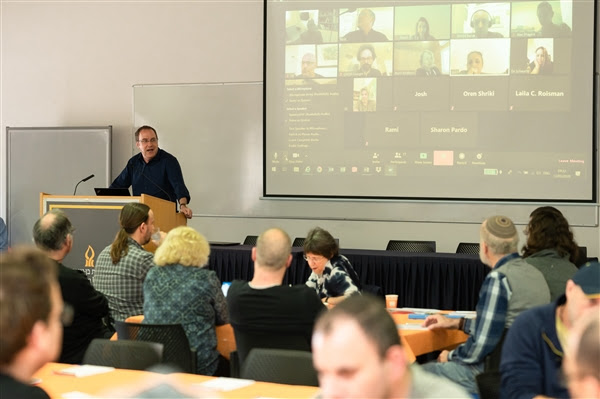
"It is our moral obligation to contribute to coping with the coronavirus pandemic" declares BGU President Prof. Daniel Chamovitz
BEER-SHEVA, Israel, March 12, 2020 – Ben-Gurion University of the Negev President Prof. Daniel Chamovitz launched the BGU Coronavirus (COVID-19) Task Force on Thursday morning to harness the University's brain power and ingenuity to help cope with the coronavirus pandemic. During a meeting attended by over 50 scientists from departments across the University, Chamovitz declared that the University would set aside resources to bring the most promising projects to fruition.
"It is our moral obligation to contribute to coping with this pandemic," President Chamovitz wrote in the letter urging all BGU researchers to join the task force.
During the launch meeting, over a dozen ideas were raised by members of departments from different faculties who then broke off into working groups. Several researchers contributed ideas via video conferencing from self-quarantine. In some cases, ongoing projects were quickly repurposed. In others, new collaborations sprung up around the discussion tables this morning.
As everyday life around the world has been affected, the effects of the coronavirus extend beyond the search for a vaccine. In addition to the University's virologists, BGU scientists and students will address the public health, public policy, engineering, information systems, economic, psychological, technological, tourism and educational challenges.
"Since the outbreak of this coronavirus, it has become an international crisis that affects individuals, families, communities and countries around the world," President Chamovitz wrote, "I am turning to you, our researchers, to make the coronavirus crisis and its repercussions your top priority, to be creative and practical in order to achieve significant contributions to the national and international challenges that stand before us."
About Ben-Gurion University of the Negev
In Israel’s Negev desert, BGU does the remarkable. Marking 50 years of cutting-edge science, BGU tackles humanity’s greatest challenges in the 21st century.
https://in.bgu.ac.il/en/Pages/default.aspx
https://www.facebook.com/BenGurionUniversity
https://www.instagram.com/bengurionuniversity/
https://www.youtube.com/user/BenGurionUniversity
https://twitter.com/bengurionu
Photo Caption: BGU President Prof. Daniel Chamovitz launches the BGU Coronavirus Task Force on Thursday morning on the Marcus Family Campus in Beer-Sheva. (Photo Credit: Dani Machlis/BGU)
- Details
- Written by Silvia G. Golan
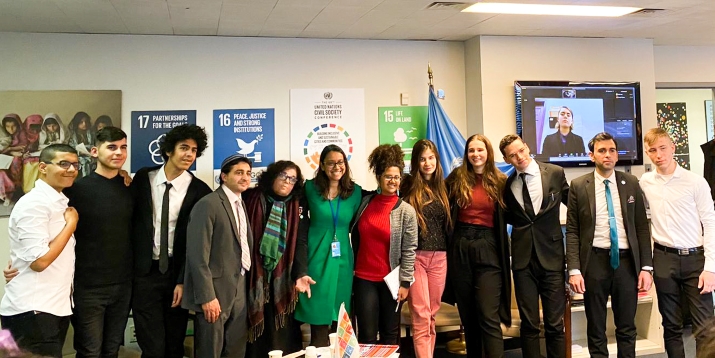
In January, students from eight cities and schools around Israel traveled to Yale MUN as part of the second annual Debate for Peace delegation to YMUN. The students competed in one of the largest MUNs in the world, with over 1600 students in thirty nine committees. In addition to conventional countries like Italy and Germany, some students participating in specialized committees received placements like Facebook, the Admiral of the Austro-Hungarian navy, NGOs, and a member of the US Congress.
The delegation members spent weeks preparing for the conference, including a study day at the US embassy, before meeting in Holon for the pre-trip briefing. In addition to the competition, the delegation included several days in NYC, for meetings with NGOs, community leaders, and diplomats.
The delegation was hosted in New Jersey by the Hoboken Jewish community, and had the honor of speaking at the United Synagogue of Hoboken as soon as they arrived in NY.
In NYC, the delegation visited the UN headquarters, and met with the Mission of Cyprus to the UN, the US Mission to the UN, and the European Union mission to the UN. They also met with the Tanenbaum Center for Interreligious Understanding, and Immigration Equality, which helps LGBTQ immigrants, as well as talking to Sheikh Musa Drammeh, and singer Josh Blanco.
The highlight of the NY visit was a panel held at the UN, organized by the NGO Committee on Sustainable Development as the first UN75 discussion, in which the delegation members led an intergenerational discussion on how to use diplomacy and discussion as tools for peace and progress in 2020.
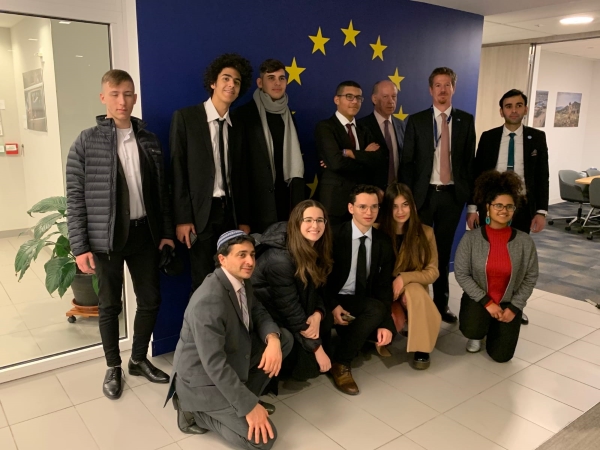
At YaleMUN, the delegation enjoyed lunch and a discussion with the Yale Council of Middle East studies, including Christian, Jewish, and Muslim students and academics, and were hosted for a meal by a local Jewish organization, JLIC. They also met with Yale professors Nathaniel Raymond and diplomat Charles Hill.
During the conference, the students three days in intensive negotiations, representing their respective countries, organizations, and characters, and responding to various international crises. The conference is one of the largest, and highest level Model UN conferences in the world, and there were 110 delegations present, included over 40 international delegations.
Yoad Hershkowitz, from Be’er Tuvia regional high school, told Diplomacy “The delegation to YMUN was an amazing experience, I have met people that have taught me so much about the world we live in. I learned a lot from my fellow participants in the delegation, and I was very happy to be a part of it.” Husni Grere, from Atid Lod MUN club, added that “as a person who's been done a plethora of MUN conferences, I can safely say that the YMUN delegation was one of my favourites, even with the very tight schedules that we've had, we were able to find times to bond, times to get to know new people, and just times to laugh a stressful day out. A truly unique and unforgettable experience.”
Debate for Peace expresses its gratitude to the many wonderful individuals and organizations who made this delegation a success, the various NGOs, diplomats and communities who met with the delegation, Rabbi Rob, Rabbi Naomi, and the United Synagogue of Hoboken community, and the Kinrot family for hosting the pre-trip meeting.
A very special thanks to Hassan Hassan for helping lead the delegation, to Samantha Glass for all of her help, to the YMUN Secretariat for helping make this delegation possible, and to Margo LaZaro, President and Chair of the NGO Committee on Sustainable
Development-NY, for empowering youth and connecting MUN to the UN. For more information please see DebateforPeace.org
- Details
- Written by Israel Ministry of Defense
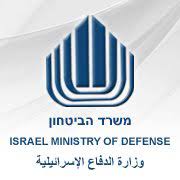
Israel Ministry of Defense Launches Expedited Procurement of Medical Equipment to Fulfill the Urgent Needs of the Defense Establishment
The Directorate of Production and Procurement in the Israel Ministry of Defense has launched an expedited procurement operation worth approximately NIS 50 million, to equip the IDF with medical equipment.
The acquisition is intended to support the defense establishment’s preparedness to cope with the COVID-19 virus and it includes: face masks, protective equipment for medical teams, medical technology and more.
The Directorate of Production and Procurement, through its Logistics Procurement Unit headed by the Deputy Director, initiated the expedited procurement of medical equipment for the IDF and the Ministry of Defense, in accordance with the instructions of Defense Minister, Naftali Bennett. The acquisition is worth approximately NIS 50 million and is the largest logistical procurement initiative since Operation Protective Edge.
The directorate has acquired face masks, gloves, personal protective equipment for medical teams, technology such as defibrillators and medical monitors, disinfectant materials and more. The procurement is based on the IDF’s demands in order to support its preparations for various scenarios.
Deputy Director General and Head of the Directorate of Production and Procurement in the Israel Ministry of Defense, Avi Dadon: “The Directorate of Production and Procurement is committed to supporting all of the operational needs of the IDF and the defense establishment. We are operating within the procedural framework of expedited procurement for emergency scenarios, in order to supply the IDF with medical equipment in the shortest possible timeframe. We are working to ensure that the majority of the procurement will be carried out in Israeli shekels in order to support the Israeli economy during this period.”
- Details
- Written by Silvia G. Golan
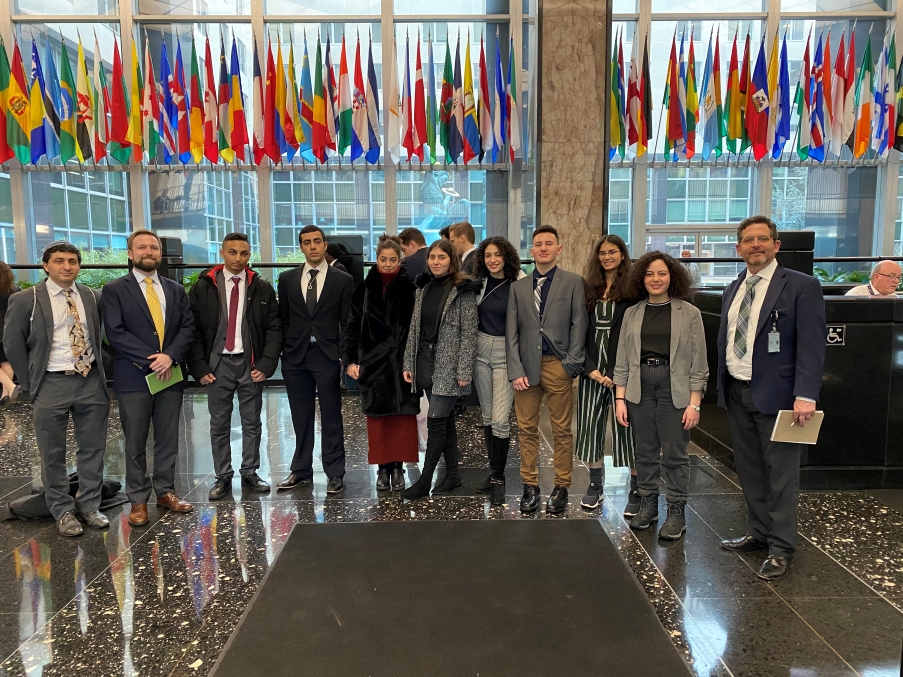
This month, students from seven cities around Israel traveled to the US to compete in the first ever Debate for Peace delegation to Johns Hopkins MUN. The students competed in one of the largest MUNs in the world, with about 1,500 students in dozens of committees. As a delegation, Debate for Peace represented Egypt in a number of committees, as well as a member of the British Parliament, the Interior Minister of Nigeria, and the Foreign Minister of Egypt during its 1973 war with Israel.
The students spent weeks preparing for the conference, including a study day at Tel Aviv University, before meeting in Iksal for the pre-trip briefing. In addition to the competition, the delegation included several days in NYC and DC, for meetings with NGOs, community leaders, and diplomats.
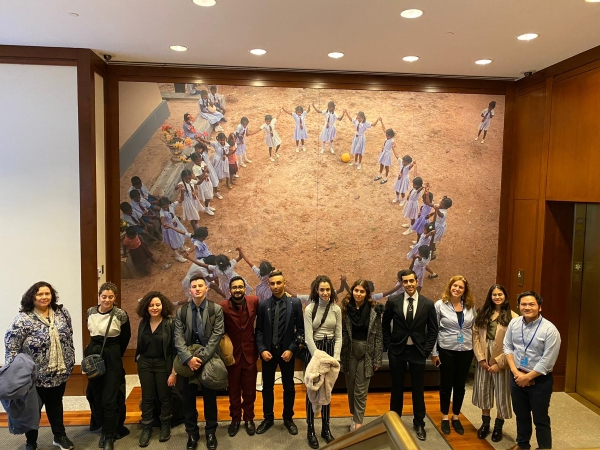
In NYC, the delegation heard from Sheikh Musa Drammeh, researcher Thomas Christiane, and Columbia University professor Dr. Page Fortna. They also visited the UN headquarters, and met with the US Mission to the UN, UNICEF, and UN Alliance of Civilizations (UNAOC). In DC they visited the US State Department, US Institute of Peace, the Project on Extremism, and the Swiss Embassy, as well as enjoying a discussion with members of Muslims for Progressive Values-DC.
The delegation also met with members of the Syrian Jewish community in New Jersey, and attempted to reach an acceptable Israeli-Palestinian framework for peace. In Baltimore, in addition to enjoying a high-level, international MUN conference, the delegation attended Juma’a prayers and a khutba sermon led by Imam Ismaeel Malik, and shabbat prayers and dinner at the historic B’nai Israel synagogue.
Following the conference, the delegation had a layover in Amsterdam, where they visited the Anne Frank House, and then traveled to the Hague, for a discussion on peace negotiations at the foreign ministry of the Netherlands, and then met with Youth Peace Initiative leaders for a discussion on grassroots peace.
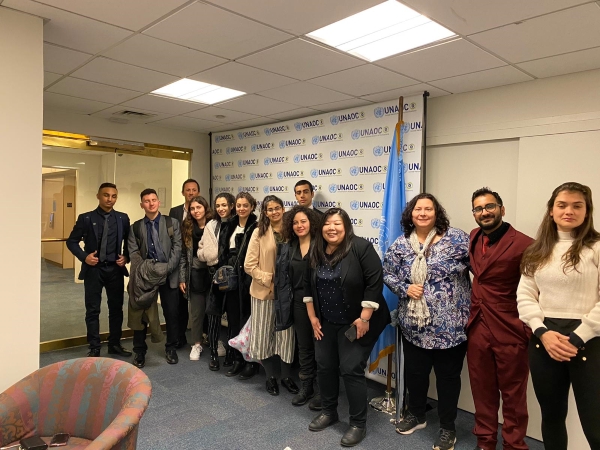
Maayan Dahan, from Hadassim school in Even Yehuda, was one of the participants. She told Diplomacy that the trip was “amazing! All the meetings and the people we met were fun and enlightening, and the conference was a blast, despite not winning I learned so much, and the general vibe of the delegation was just so fun, everyone connected really well with the other.” Bashar Shalabi, from Iksal high school, said that this was “a great experience to spend 3 days debating with 84 native speakers.” Nadiv Brenner Ballin, from Sulam Tzur high school added that “due to the significant people and places we visited on the delegation, this experience will stay with me for a long time.”
Debate for Peace thanks the many wonderful individuals and organizations who made this delegation a success, the various NGOs, diplomats and communities who met with the delegation, the JHUMUN staff for the enriching academic experience, Johns Hopkins students for hosting the delegation in Baltimore, and the Abu Odeh family for hosting the pre-trip meeting. A very special thanks to Imam Ismaeel Malik for helping lead the delegation, and to Jake Morris for helping make the delegation happen. For more information please see DebateforPeace.org
Photos by
DebateforPeace
https://debateforpeace.wordpress.com/about/








